Northwell Health President and CEO Michael Dowling's new book, Leading Through a Pandemic, details how he navigated New York’s largest health care system through the worst of the pandemic. Here Dowling talks about Northwell’s preparedness for COVID, and how his staff stepped up and saved lives.
*Editor's Note: This column appeared in the August 26 edition of the Irish Voice newspaper, sister publication to IrishCentral.
Michael Dowling, the president and CEO of Northwell Health, New York State’s largest provider of health care services, has always played to win. From his days as a top hurler in his native county, Limerick, to his immigrant journey to New York in 1968, working his way through college and eventually earning top posts in both academia and the administration of Governor Mario Cuomo, Dowling doesn’t take kindly to the word no.
Except when he’s asked the following question: Was there ever a point when he thought COVID-19 might overwhelm the 72,000 strong workforces at Northwell, which he has led since 2002?
“No, no. Never,” Dowling says with emphasis during an interview last week with the Irish Voice.
“This was something that we were going to tackle, and we were going to win. There was never a moment of doubt that we were going to lose. The people on the front lines, they knew it. I’d be out there walking the floors in the hospitals, and all the front line workers would say to me, ‘We got this.’
“It’s like going into a hurling game and thinking that you are going to lose before you go in. You have to think you are going to win. The issue we had with COVID is that we didn’t know how long it would take -- weeks, months -- but however long it was going to last, we were going to last longer.”
Dowling is by no means saying New York is out of the COVID woods – “right now, we’re at halftime,” he feels – but since the pandemic took root and forced the state to pretty much shut down in March, we’ve gotten stronger and, crucially, much smarter in playing offense.
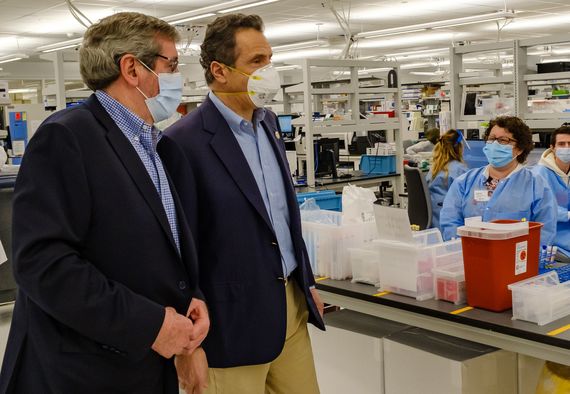
Michael Dowling and Governor Andrew Cuomo tour Northwell’s Health Core Lab in New Hyde Park, Long Island on April 19.
His new book, Leading Through a Pandemic: The Inside Story of Humanity, Innovation, and Lessons Learned During the COVID-19 Crisis (Skyhorse Publishing), co-authored with Charles Kenney, provides a gripping, first-hand account of what it was like to combat the “unknown enemy,” as Dowling describes COVID, and also outlines the need for health care systems to have plans in place to deal with emergencies which, one way or another, will surely happen.
Most of all, the book is chock full of praise for Northwell’s front line workers who willingly risked their lives every day so that others could live. Dowling’s daughter, Elizabeth, a nurse at Lenox Hill Hospital at one point told her parents, “I never again want to see people this sick.”
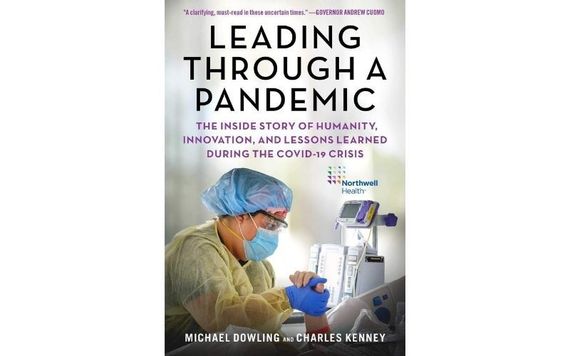
Leading Through a Pandemic: The Inside Story of Humanity, Innovation, and Lessons Learned During the Covid-19 Crisis, by Michael Dowling.
The metro New York area, Dowling says, will always be ripe for a major catastrophe requiring a massive level of immediate hospital care. This was made clear to Dowling and his team more than two decades ago, prior to 9-11.
During a meeting with Northwell’s top executives John O’Neill, the former celebrated FBI agent, said that it was a matter of when, not if, Americans would be attacked on their own soil. As a result, Dowling immediately green-lighted the creation of a new Northwell emergency management unit.
O’Neill’s guidance was sadly prophetic. After he left the FBI he took a job as head of security at the World Trade Center, and on September 11, 2001, he lost his life while evacuating people from the burning North Tower.
Read more: Oxford COVID-19 vaccine could go before regulators by end of 2020
“Northwell held a conference before 9-11 and I remember it vividly. We invited every other hospital in the region but very few attended. I was interviewed by the press afterward and they were asking why we did this. And I said that you never know what’s going to happen; unique circumstances can occur,” Dowling recalls.
“Then a year later we all learned of Osama bin Laden. By that time we had built our ambulance network and put together an emergency management structure. The disaster could be a hurricane or a massive flood. And each year we have upgraded our emergency management. We have very sophisticated processes here. This year, we had to use them.”
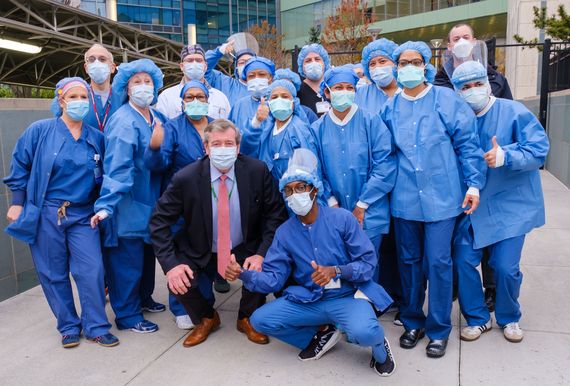
Dowling photographed with frontline workers.
COVID an "invisible enemy"
That's putting it mildly. In January the coronavirus was something going on in faraway China; by February the state of Washington reported its first death; and in March COVID exploded into scary reality, a pandemic escalating by the minute that forced much of the United States – particularly New York, which was the U.S. epicenter – to shut down and quarantine.
“We were fighting a war against an invisible enemy,” Dowling says of the early days when his hospital system had to flip the switch and completely redesign the way it did business. Elective surgeries were canceled, new initiatives put on the back burner, and budgets were out the window as fighting COVID-19 was all that mattered.
“We knew little about COVID. It was like guerilla warfare – you know something is trying to kill you but you can’t see it. In the early days, we didn’t know much about the virus and that was our biggest problem,” Dowling remembers.
Read more: Boston pub owned by Dropkick Murphys frontman shutters due to COVID-19
“Everybody thought at first it only affected the lungs, and we didn’t realize that it could cause blood clots. A lot of things, in the beginning, were trial and error. Our ICU doctors and everyone, they said, ‘Why is it that someone first comes in and they look okay, and then an hour later they are so badly affected?’ A month later we knew an awful lot more.”
Dowling’s book is dedicated to the heroism of Northwell’s front line staff who literally risked their lives so that the sick could have a fighting chance. He wasn’t a CEO planted behind a desk during the worst of the crisis and spent large parts of every day walking the corridors of Northwell’s 23 hospitals to see first hand the devastation that Covid-19 wrought. (Northwell has treated more than 70,000 COVID patients and added more than 1,600 new hospital beds throughout its system in record time to deal with the surge.)
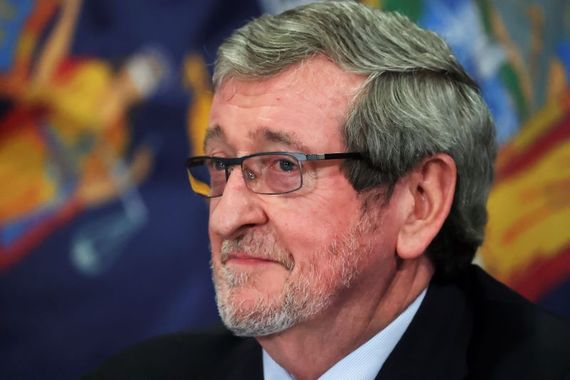
Michael Dowling.
“The commitment of the staff was absolutely extraordinary,” Dowling says. “In crisis people’s true character is displayed. It’s fine to be great in good times, but can you be great in bad times?
“In bad times we saw the best of the best, people uniting together responding to a common enemy. They came to work even though they knew they were in danger. They saw an unbelievable amount of death. On one occasion a member of the staff told me, ‘Everything is going fine, but my mother just died on the same floor.’ That person wouldn’t take a break, and wanted to stay with the team and keep fighting. Health care workers are a special breed.”
Dealing with COVID-19 was a 24-7 job for Northwell, starting in January 2020 “when our surveillance team saw the development of a new virus in Wuhan, China…we began pulling our emergency operation together. Many people think of China as the other side of the world, but in our command center we think of it as a half-day plane ride,” Dowling writes in his book.
Come March, some top Northwell executives contracted the virus and a decision was quickly made to have many workers do their jobs from home, staying in constant touch via Zoom and other online methods to track daily COVID metrics, PPE inventory, staffing issues, numbers of beds – “at one point we were creating 200 new beds a day,” Dowling says – and any issues that came up the day before that weren’t anticipated.
“All of this had been outlined in our emergency plans. Plans are great, but implementation is another thing. A plan is a paper; reality is making it happen,” he adds.
Operating on the fly, and making do with non-traditional solutions – for example, using baby video monitors to watch sick patients so that nurses wouldn’t have to be in constant close contact, and garden hoses bought from Home Depot to help ventilators work – was also par for the course in Northwell hospitals.
Read more: Coronavirus live updates from Ireland
A big decision, one which Dowling credits with saving a vast number of lives, came early in March, when Northwell’s chief of emergency medicine, Dr. John D’Angelo, realized that ER patients initially deemed to be non-COVID quickly descended into dire straits, requiring ventilators in a matter of hours. The potential infection of staff during that time when COVID was undiagnosed, he wisely reckoned, required immediate action: the mandatory wearing of masks in the ER. Mask wearing is a political hot potato these days thanks to President Trump, but Dowling and his Northwell team have no doubt that masks save lives.
“It became clear to D’Angelo that any patient walking into any of our emergency departments – whether they had traveled anywhere or not, whether they had checked the symptom boxes from the CDC or not – might be a carrier of the virus. This was, to say the least, alarming, for it meant that literally any person walking in the door of any of our emergency departments might be a threat to our staff,” Dowling writes.
“And if that were the case, then every staff person and every patient in all of our EDs had to be masked to prevent the spread…up to that point, the number of emergency department team members out sick and suspected of having the virus had been steadily climbing. After the mask mandate was put in place, many fewer staff members got sick, even as the number of patients increased at a staggering rate in the weeks ahead.”
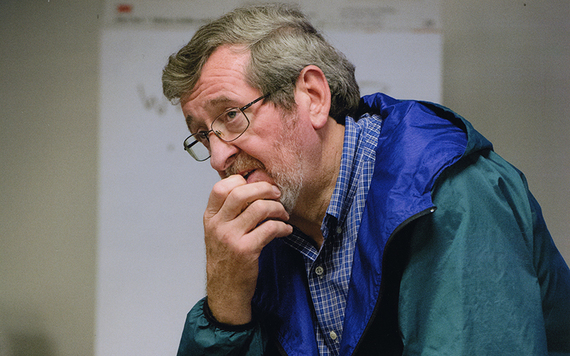
Michael Dowling.
PPE supplies, or lack thereof, was an issue of huge concern for health care workers all over the country once Covid was omnipresent. There were shortages most everywhere, and frustration that American hospitals were competing against each other for products that were often made in China and marked up at staggering prices. Workers at one hospital not in Northwell’s network, Mount Sinai in Manhattan, were disturbingly photographed wearing garbage bags due to a shortage of gowns.
Dowling assures that Northwell was never in danger of running out of protective gear thanks to years of relationship building with manufacturers spearheaded by the system’s chief procurement officer Phyllis McCready. He writes in his book that making the staff feel physically comfortable when they entered their workplace was of paramount importance.
“[We] had a solution: Set up a PPE station at the entrance when employees arrived for their shift. ‘So, when you come into work through our team entrance, we have someone handing you snacks to make your shift that shift that much better. And the next thing you walk past is a huge PPE depot. Do you need a mask? Do you need a gown? Do you need more gloves? Whatever you need, no questions asked,’” he writes.
New York Gov. Cuomo
Dowling has a long-standing, familial relationship with the Cuomo family. He was a top aide and close friend of former New York Governor Mario Cuomo, serving as his deputy secretary and director of health, education, and human services for a dozen years.
So it’s not surprising that Mario’s son, Governor Andrew, whose daily COVID briefings were must-see TV during the worst days in New York, tapped Dowling to lead the effort to coordinate the COVID responses of other hospital networks in the state.
“Michael Dowling…is head of Northwell. They’ve done an extraordinary job all through this situation. They have an extraordinary leader in Michael Dowling. Michael Dowling ran health care for the State of New York, health services for the State of New York. He worked with my father. Came for one year, wound up staying with my father for 12 years in state service. He’s one of the really beautiful and brilliant leaders in this state. It’s a pleasure to be with him,” Cuomo said in one of his televised briefings with the Northwell leader by his side.
Dowling is equally effusive of the job Cuomo did in soothing the fears of New Yorkers, and indeed the nation, when COVID was the frightening unknown.
“The governor was out there giving very clear messages. He was the chief educator, sticking to the facts,” Dowling says.
“And that’s what leadership is – projecting a vision. It’s about bringing people together and unifying. It’s about taking accountability, it’s about planning for tomorrow. You take that with what’s happened nationally, and it’s the very opposite.”
Dowling pulls no punches when talking about President Trump’s handling of Covid-19. Telling Americans that he’s not in favor of mask-wearing and that the virus will just “disappear,” was – is – disastrous.
“Inside our health system, COVID wasn’t political. We work as one system and when we make a decision it applies across the board. But when you have a complete lack of national leadership, when you have the chief executive of the United States telling people this is not serious, that he won’t wear a mask, that he doesn’t believe COVID is real, it’s just so dangerous,” Dowling says.
New York, for several long and deadly weeks the epicenter of the outbreak, is now the shining example of virus control. Flattening the curve didn’t come easy, with economic shutdowns – some of which are still in effect – and a COVID death toll of more than 32,000.
The state’s infection rate is now less than one percent, and hospital systems, including Northwell, have pivoted back to semi-normal, resuming elective surgeries and other procedures that were put on the back burner during the worst of COVID. (Dowling says that Northwell has lost close to $2 billion in revenue since March, but “you can’t be worried about a budget in the middle of a crisis when lives are at stake.”)
Thinking that the worst is behind us, though, is a mistake, Dowling cautions. It won’t be surprising, he says, if a second wave hits New York, a possibility that Northwell continues to plan for every day.
“I believe we will have a second wave. How extensive and large it’s going to be, I don’t know,” he says.
“I don’t think it will be anything as bad as what we had, but I do think that we will have an uptick. That’s what happens with pandemics – they come, they hit you, they disappear and they come back. The worst thing to do is sit back and be complacent. We haven’t won. We are having a reprieve. Six months from now we’ll know if we’ve won or not.”
What does winning look like? The world will be different for a long time, Dowling feels. A proven vaccine, which he hopes will be available next spring, will hopefully take care of things on the medical side.
“But the other end is the economic disruption, the unemployment, the businesses that will never reopen. The effects of COVID on that will last a decade. And we will be different because of it,” he says.
“We are never going back to the old normal. We will be using technology more. A lot of workers will be working from home. We will be using telemedicine a lot more.
“This has been a humbling and terrible experience. I do, however, believe that it has changed our perspective. If we as a country learn from it we will be much better prepared for the future. And if we don’t learn from it, we can put ourselves down as being stupid.”
Dowling carved out time to write his book during spare hours on the weekends. He felt it was important to document the pandemic while events were fresh in his mind. But what he saw on the front lines, he will never forget.
“I walked through the hospital halls, seeing people on ventilators, and you knew that half of them were going to die,” he says.
“It was tragic. But I just cannot say enough about the Northwell staff who saved so many lives. My job was easy in comparison.”
Read more: Phil Hogan resigns from role as EU Commissioner for Trade
* Leading Through a Pandemic: The Inside Story of Humanity, Innovation, and Lessons Learned During the Covid-19 Crisis is available through Amazon, Barnes & Noble, and booksellers throughout the U.S.
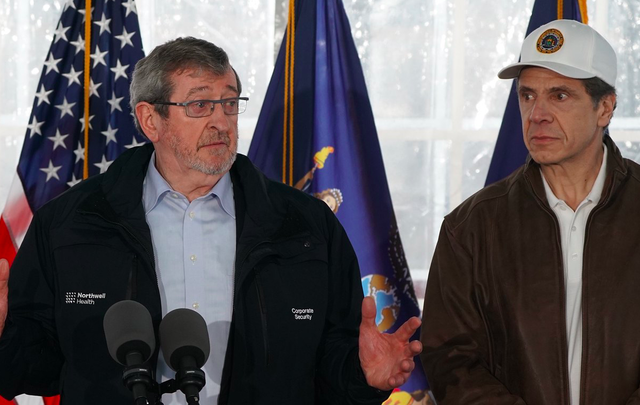


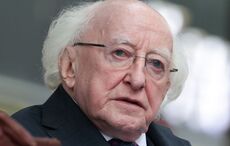
Comments